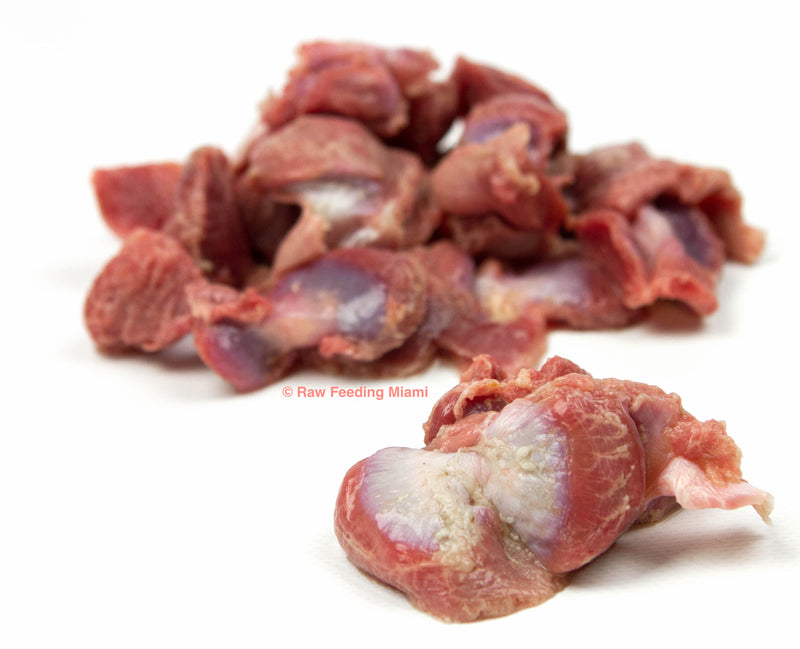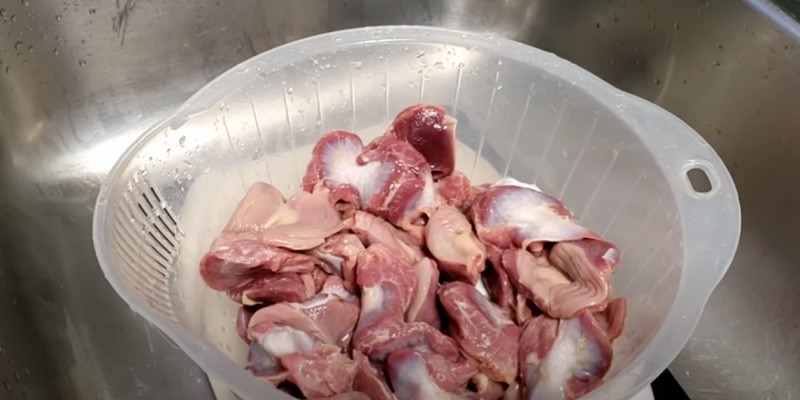Last Updated on April 23, 2025 by Pauline G. Carter
Yes, chicken gizzards are good for dogs as they are a healthy, nutrient-rich source of protein and essential vitamins. Dog owners can feed chicken gizzards as a supplement to their pet’s regular diet or as part of a balanced homemade meal.
However, it is important to cook the gizzards thoroughly to eliminate any potential bacteria or parasites that may be harmful to dogs. Additionally, it’s recommended to consult with a veterinarian before introducing new foods to your dog’s diet to ensure it suits their individual dietary needs.
By providing chicken gizzards in moderation, dog owners can offer their pets a tasty and nutritious treat.

Credit: www.rawfeedingmiami.com
Chicken Gizzards
Chicken gizzards can be a good addition to a dog’s diet, as they are a rich source of protein and essential nutrients. They can help improve digestion and promote overall health for our canine friends.
Chicken Gizzards: Definition And Composition
Before exploring the benefits of chicken gizzards for dogs, it is essential to understand what chicken gizzards actually are and what they consist of. A gizzard is a part of the chicken’s digestive system and is found just after the stomach. It is a muscular organ that plays a crucial role in grinding food.
A chicken gizzard is composed of dense muscle tissue and connective tissue, which gives it a slightly tough and chewy texture. It also contains a small amount of fat and is covered with a tough membrane that needs to be removed before feeding it to your furry friend.
Anatomical Overview
To better understand the benefits of chicken gizzards for dogs, let’s take a closer look at the anatomy of this organ. The gizzard is responsible for breaking down food particles into smaller, more digestible pieces. It achieves this through powerful contractions of its muscular walls.
Located near the chicken’s stomach, the gizzard receives partially digested food and uses its muscles to grind it before passing it through to the rest of the digestive tract. This unique design allows chickens to effectively process their food, but what about dogs?
Nutritional Components
When it comes to the nutritional value of chicken gizzards, they are highly beneficial for dogs. These organ meats are packed with essential nutrients that contribute to the overall health and well-being of your furry companion.
Chicken gizzards are an excellent source of high-quality protein, which is vital for the growth, maintenance, and repair of cells in your dog’s body. They also contain essential amino acids, including taurine, which is necessary for cardiac health.
In addition to protein, chicken gizzards are rich in key vitamins and minerals. They provide an abundant supply of iron, zinc, phosphorus, and B vitamins. These nutrients support various bodily functions, including immune system function, energy production, and bone health.
Overall, feeding your dog chicken gizzards can be a valuable addition to their diet. They offer a wide range of nutrients that contribute to their overall health and vitality. However, it is important to remember that moderation is key. Consult with your veterinarian about the appropriate amount of chicken gizzards to include in your dog’s diet.
Health Benefits Of Chicken Gizzards For Dogs
Are chicken gizzards good for dogs? Absolutely! In fact, chicken gizzards offer an array of health benefits for our furry friends. Packed with essential nutrients, high protein content, vitamins and minerals, beneficial fats and amino acids, chicken gizzards can greatly contribute to your dog’s overall health and well-being. Not only do they promote improved digestion and nutrient absorption, but they also play a vital role in maintaining a healthy weight. Let’s explore the various health benefits of chicken gizzards for dogs in more detail.
Essential Nutrients In Chicken Gizzards
Chicken gizzards are a nutritional powerhouse, containing a wide range of essential nutrients that are beneficial for dogs. These include:
| Essential Nutrients |
|---|
| Protein |
| Iron |
| Zinc |
| Vitamin B12 |
| Phosphorus |
High Protein Content
Protein is a vital component of a dog’s diet, as it supports muscle growth, repair, and overall development. Chicken gizzards are an excellent source of protein, providing the necessary building blocks for strong and healthy muscles.
Rich In Vitamins And Minerals
Chicken gizzards are also rich in vitamins and minerals, such as iron, zinc, vitamin B12, and phosphorus. These nutrients are important for various bodily functions, including immune system support, red blood cell production, and bone health.
Beneficial Fats And Amino Acids
In addition to being a great source of protein, chicken gizzards contain beneficial fats and amino acids. These fats are essential for maintaining healthy skin and a shiny coat, while amino acids contribute to cell repair and overall well-being.
Improved Digestion And Nutrient Absorption
The unique texture of chicken gizzards provides a natural way to promote improved digestion in dogs. Chewing on gizzards can help remove plaque and tartar from their teeth and stimulate saliva production, aiding in the breakdown of food and nutrient absorption.
Role Of Gizzards In Promoting Digestive Health
Rich in collagen and connective tissue, chicken gizzards help support the digestive system by strengthening the lining of the stomach and intestines. This can lead to a healthier gut and reduce the risk of digestive issues such as bloating and gas.
Enhancing Nutrient Utilization
By consuming chicken gizzards, dogs can enhance their nutrient utilization. The high-quality protein and essential nutrients found in gizzards can be easily absorbed and utilized by the body, ensuring that your dog receives maximum nutrition from their diet.
Maintaining A Healthy Weight
Chicken gizzards are low in calories and fat, making them an ideal addition to a weight management plan for dogs. The high protein content in gizzards helps dogs feel full and satisfied, reducing the likelihood of overeating and maintaining a healthy weight.
Low In Calories And Fat
When it comes to maintaining a healthy weight, chicken gizzards are a great choice. They are low in calories and fat, offering a nutritious and satisfying treat for dogs without adding excess pounds.
So, if you’re looking to support your dog’s overall health and digestion, consider adding chicken gizzards to their diet. These nutrient-dense organ meats provide a wealth of benefits, from improving digestion and nutrient absorption to supporting healthy weight management. Just remember to feed them in moderation, as a treat or as part of a balanced meal, to ensure your dog enjoys all the health benefits they offer.
Considerations And Precautions
When it comes to feeding chicken gizzards to your beloved furry friend, it is crucial to take certain considerations and precautions. While gizzards can be a healthy addition to your dog’s diet, it is essential to understand how to incorporate them safely and maintain a balanced intake.
Moderation And Portion Control
Moderation is key when it comes to feeding chicken gizzards to your dog. While they offer great nutritional benefits, excessive consumption can lead to digestive issues. It is recommended to include gizzards as a part of a varied and balanced diet rather than making them the main component of your dog’s meals.
Balancing Gizzard Intake With Other Foods
It’s important to ensure that your dog’s overall diet is balanced and includes a variety of proteins, carbohydrates, fruits, and vegetables. While chicken gizzards can be a valuable source of protein, it is crucial to include other types of meat and food to provide a complete and well-rounded nutritional profile.
Avoiding Excessive Consumption
Dogs have different dietary needs, so it’s essential to consider their size, age, and activity level when determining the appropriate amount of gizzards to feed. Excessive consumption can lead to digestive upset and potential nutrient imbalances. Always consult with your veterinarian to determine the best serving size for your specific dog.
Potential Risks And Allergies
Although chicken gizzards are generally safe for dogs, it is important to be aware of potential risks and allergies. Some dogs may have sensitivities or allergies to certain proteins, including chicken. Keep a close eye on your dog’s reaction after consuming gizzards and discontinue feeding if any adverse symptoms, such as vomiting or diarrhea, occur.
Allergic Reactions And Sensitivities
If your dog has a known history of allergies or sensitivities, it is recommended to introduce chicken gizzards gradually and monitor their response. Allergic reactions can manifest as itching, redness, or gastrointestinal symptoms. If any signs of an allergic reaction occur, consult your veterinarian immediately.
Supervision And Monitoring For Adverse Effects
While gizzards can provide valuable nutrients to your dog’s diet, it is important to supervise them during mealtime and monitor for any adverse effects. If you notice any discomfort, such as choking or swallowing difficulties, take necessary precautions and consult your veterinarian for guidance.
Preparation And Cooking Methods
When preparing chicken gizzards for your dog, it is crucial to follow safe handling and cooking practices. This includes thorough washing of the gizzards, proper cooking to ensure they are fully cooked and free from harmful bacteria, and avoiding the use of seasonings or spices that may be harmful to dogs.
Safe Handling Practices
Safe handling practices are vital to keep both you and your dog safe. Always wash your hands after handling raw chicken gizzards and ensure that any surfaces or utensils used in the preparation process are properly cleaned and sanitized to avoid cross-contamination.
While chicken gizzards can be a healthy addition to your dog’s diet, it is essential to consider these considerations and precautions to ensure their well-being and overall health. By practicing moderation, balancing gizzard intake with other foods, and being aware of potential risks and allergies, you can safely incorporate this nutritious protein source into your furry friend’s meals.
Frequently Asked Questions Of Are Chicken Gizzards Good For Dogs?
Are Chicken Gizzards Safe For Dogs To Eat?
Yes, chicken gizzards are safe for dogs to eat as long as they’re cooked properly.
Can Dogs Digest Chicken Gizzards Easily?
Yes, dogs have a strong digestive system that can handle chicken gizzards well.
What Are The Nutritional Benefits Of Chicken Gizzards For Dogs?
Chicken gizzards are packed with protein, iron, zinc, and vitamin B12, making them a nutritious addition to your dog’s diet.
Are There Any Risks In Feeding Chicken Gizzards To Dogs?
While chicken gizzards are generally safe, they should be given in moderation to prevent any digestive issues.
How Should Chicken Gizzards Be Prepared For Dogs?
Chicken gizzards should be thoroughly cooked, without any seasoning, to ensure they’re safe and healthy for your dog.
Can Chicken Gizzards Be A Good Alternative To Commercial Dog Treats?
Yes, chicken gizzards can be a healthy and affordable alternative to store-bought dog treats.
Conclusion
To sum it up, chicken gizzards can be a great addition to your dog’s diet when fed in moderation. Rich in protein and essential nutrients, they can support your canine friend’s overall health and provide a delicious and satisfying treat.
However, it’s crucial to prepare them properly, removing any potential hazards like bones, and being aware of your dog’s specific dietary needs and any potential allergies. Always consult with your veterinarian to ensure a balanced and safe diet for your furry companion.
Happy feeding!

